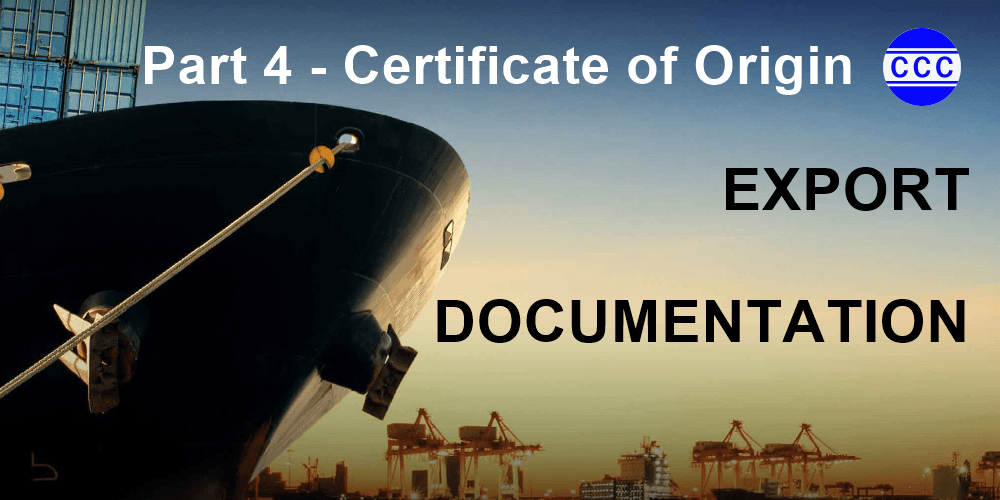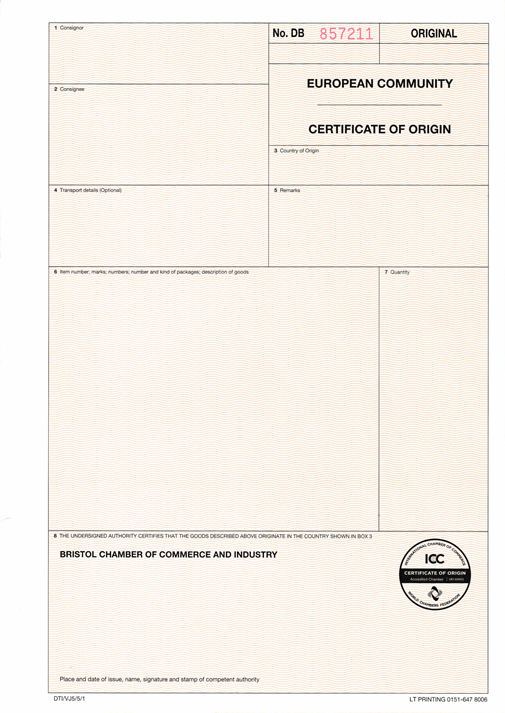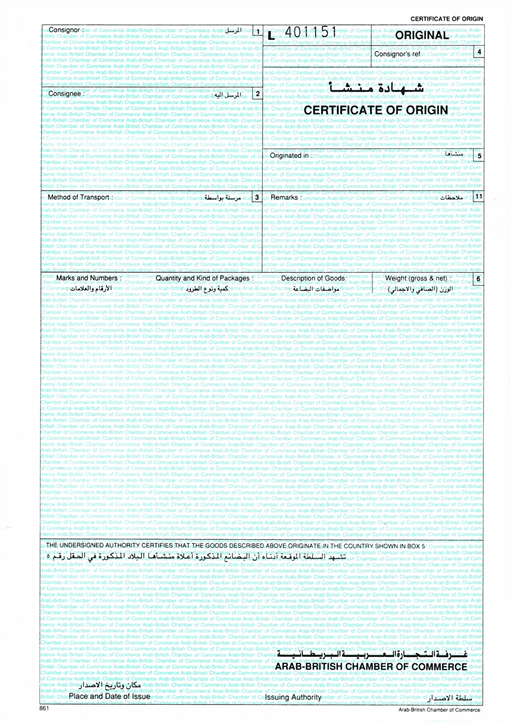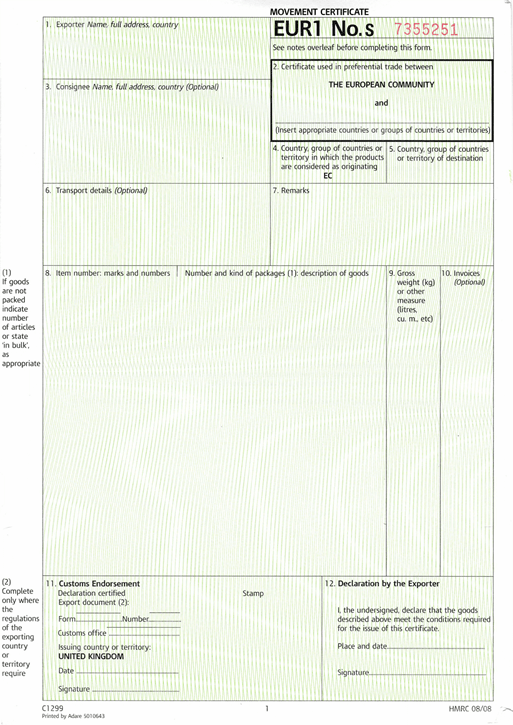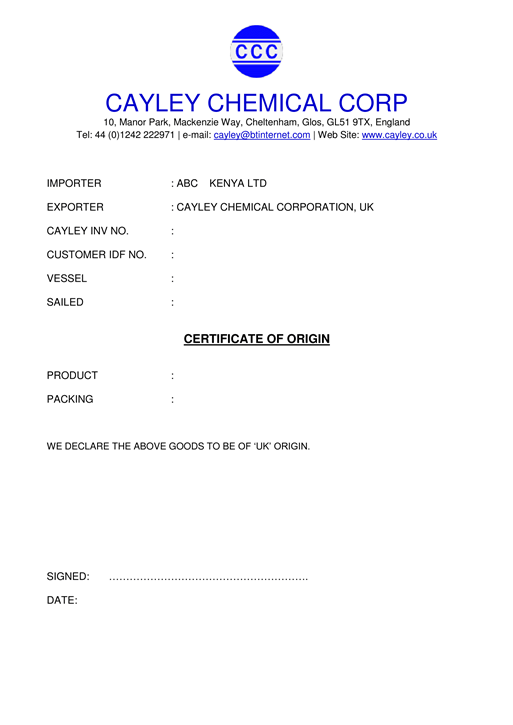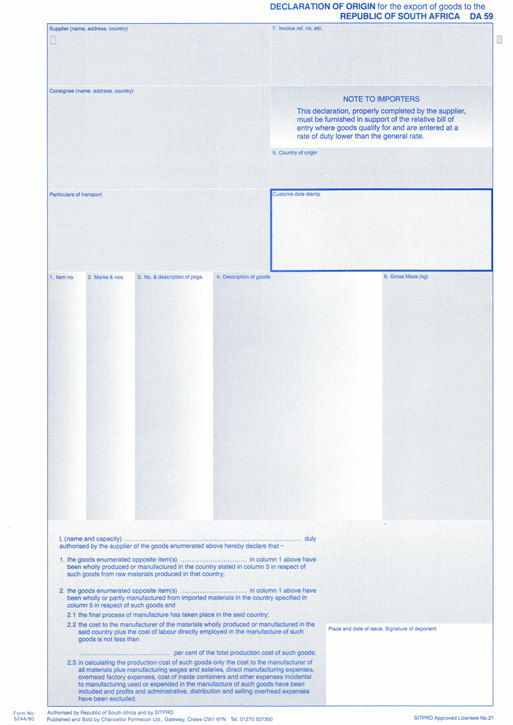Export Documentation: Part 4 – Certificate of Origin
Export documentation is critical. It needs to very accurate and comprehensive and to meet the full requirements of the importing country. Previously we have examined:
This month we will be looking at the Certificate of Origin
Certificate of Origin
A certificate of origin (often abbreviated to C/O or CofO or CoO) in a printed form or as an electronic document is completed by the exporter and certified by a recognised issuing body, confirming that the goods in an export shipment have been produced, manufactured or processed in a particular country or trading bloc.
The origin of the product does not refer to the country where the goods were shipped from but to the country where they were manufactured. Where products are manufactured in two or more countries, origin is obtained in the country where the last substantial, economically justified working or processing is carried out. A frequently used method of determining country of origin is that if more than 50% of the cost of producing the goods originates from one country, then that country is deemed to be the country of origin.
In the case of trading blocs (e.g. the European Union), certificates of origin may be allowed to state the trading bloc as origin rather than a specific country within the bloc. Determining the origin of a product is important because origin is critical to dertermining tariffs, embargo restrictions and other international trade policies.
There are many types of CofO’s and below are the most common:
European Community Certificate of Origin:-
For exports from the UK/EU where the Importing country requires a formal document stamped and signed by a Chamber of Commerce, use a Standard formal CofO. Leave box 5 blank. In the main body give the packing on a nett basis typing N/W after the number. In the main body after the last line of description put a ruled line through the rest. Get the document stamped and signed by the local chamber of commerce and produce any proof they may require to prove the origin.
Arab-British Certificate of Origin:-
This applies to exports from the UK to the Middle East where the Importing country requires a formal doc stamped and signed by a UK Chamber of Commerce and the Arab-British Chamber of Commerce. Leave box 5 blank. In the main body give the packing on a nett basis typing N/W after the number. In the main body after the last line of description put a ruled line through the rest and send to your Chamber of Commerce to be stamped and signed and request they send on to the Arab-British Chamber of Commerce for them to also stamp and sign.
EUR1 Certificate of Origin:-
For exports from the UK/EU where the Importing country has a trade agreement with the EU, a formal document stamped by UK customs known as a EUR1 is required. As with all CofOs this document is needed to clear customs in the importing country but is also needed by the importer to apply NIL Import Duty, so it is critical. It must be filled in very carefully as any errors will cause it to be rejected by the Importing country’s customs. Fill in boxes 1, 2, 4 &.5. Leave boxes 3 & 6 blank.
Usually UK customs will stamp and sign after BL date so in box 7 type:” Issued Retrospectively”. In box 8 type: “Addressed”. In Box 8 (description) this must match the BL and Invoice. After the description type the Customs Tariff Classification number and Tariff Heading. And then in the main body after the last line of description put a ruled line through the rest. Box 9 must match the BL. This document must be stamped and signed by UK customs and either your freight forwarder or their Chamber of Commerce will act as agent.
Basic exporters Certificate of Origin:-
This is a general CofO that is created on the exporters headed paper, where no special document is required e.g. exports to Kenya. This is a very basic document but make sure all the information matches the Bill of Lading and Invoice. Once completed – self-stamp, sign and date the document.
DA59 Certificate of Origin:-
Exports to South Africa require this DA59 Cert of Origin. As with the Basic CofO above, make sure all the information matches the Bill of Lading and Invoice. Once completed – self-stamp, sign and date the document.
To see our full range of regularly supplied chemical raw materials, please click the ‘Products’ button below and scan through our products or search for a particular product.
Cayley Chemicals can supply a very broad range of products at very competitive prices to virtually anywhere in the world. Get in touch with us now with your name, email address, product name, specification, quantity, destination and any special requirements and we will get back to you very quickly.

